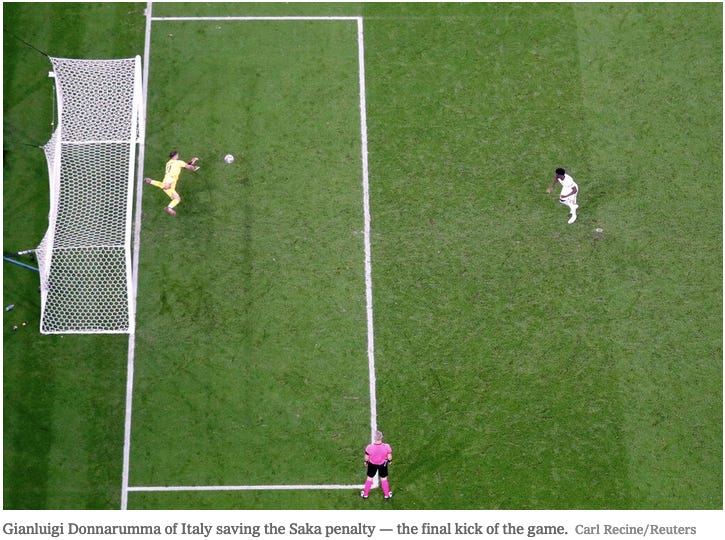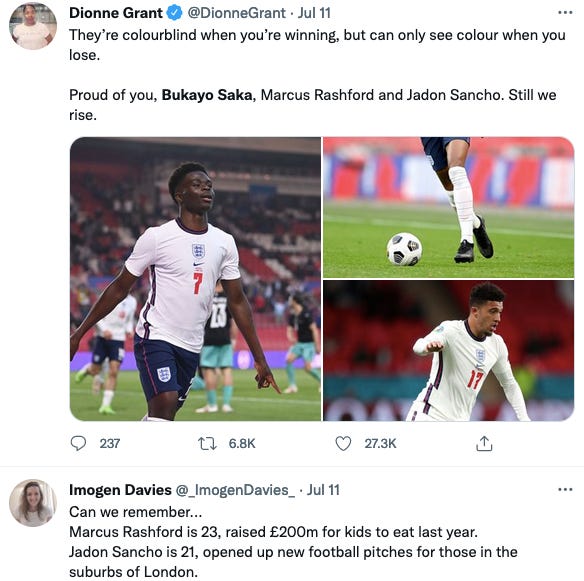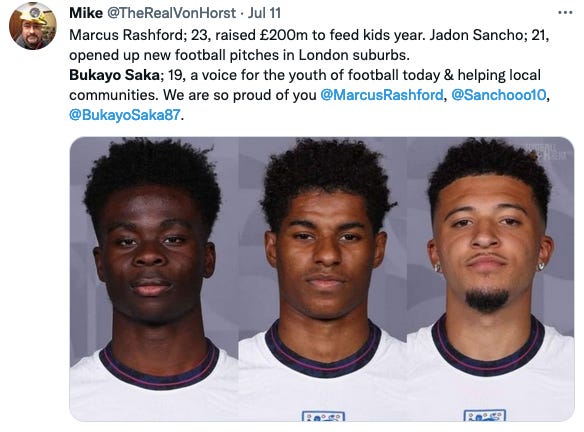When I realized that all three missed penalties had been attempted by English players of color, I cringed - less because of England's loss, more because I knew of the racism that was sure to come.
I know that many laud the benefits of social media. To me, it is mostly a platform for the most ignorant and contemptible among us.
It was a moment that life prepares no 19-year-old (or anyone else) for. Yet there was Bukayo Saka on a soccer pitch with the weight of England resting upon his slender shoulders. Saka is a supremely talented player for Arsenal in the English Premier League. On this day, he was representing England in the final of the 2020 European Championship. He’d never taken a penalty kick in a senior-level match and certainly never one with so much at stake. The game was at historic Wembley Stadium in London, in front of about 60,000 passionate and mostly English fans. It was a big deal…and Saka knew it.
As he stood over a soccer ball resting serenely on the penalty spot, Saka was well aware of the pressure and the predicament he faced. Because two of the four English players before him had performed so terribly, Saka had to beat Italian goalkeeper Gianluigi Donnarumma (himself only 22) and put his penalty kick firmly into the back of the net. It was a do-or-die, make-it-or-go-home moment. Make it, and England was still alive. Miss it, and Italy would take home the trophy.
England hadn’t won a major tournament since 1966, so there were ghosts to be exorcised…and it fell to Bukayo Saka to make it possible for that to happen.
In most penalty-kick situations, the player taking the kick has a decided advantage. This is because he knows which way he’s going- right, left, or straight down the middle- and the goalkeeper can’t move until the ball is struck. Thus, the goalkeeper is forced to guess where the ball is going and dive accordingly. Because of this, the player taking the kick normally has an 80-90% chance of success.
On television, a penalty kick looks easy. The ball is placed on a dot 12 yards from the goal, and the goalkeeper can’t move until the ball is struck by the player taking the kick. But, unfortunately, the history of soccer is rife with examples of players clanking the game’s equivalent of a slam dunk at the worst possible moment.
The referee blew his whistle, and the crowd held its collective breath. Saka made his approach and tentatively struck the ball, pushing it to Donnarumma’s left. The Italian dove in the same direction and somehow got both of his hands on the ball. As he pushed Saka’s shot safely to his left, the fortunes of one nation (Italy) ascended to the heavens even as another’s (England) sunk to the depths of despair before the ball hit the ground.
Almost instantaneously, the explosions of joy and elation mixed with cries of despondency and dashed hopes. Donarumma’s Italian teammates mobbed him as he wandered, stunned, in front of his goal. It was as if he wasn’t quite certain what had just taken place.
Saka’s teammates and England’s coach, Gareth Southgate, himself no stranger to missing penalty kicks in big moments, embraced Saka. They knew that they hadn’t lost because of Saka, even though they understood that would be the headlines in the next morning’s tabloids.
Something that went unrealized in the immediate aftermath of Saka’s missed penalty kick was an issue far more sinister than anything involving a mere soccer game. Along with Bukayo Saka, the other English players to miss their penalty kicks- Marcus Rashford and Jadon Sancho- are Black. To most of us here in the United States, that would hardly seem notable, but it was picked up immediately by racists and haters in England.
By late evening and into Monday morning, social media was aflame with racist insults and threats directed at Saka, Rashford, and Sancho. The fact that they’re all Black is, of course, merely coincidental- except to the knuckle-draggers to whom it’s an opportunity to spread hatred and exclusionary thinking.
All three, along with the rest of their England teammates, performed at a high level during arguably the world’s toughest soccer tournament. Moreover, they took a team that few picked to reach the final to the brink of a title. So while one can legitimately question Southgate’s choice of players to take the first five penalty kicks, the race of the players who did take them is of no consequence.
Though all very young, Saka, Rashford, and Sancho have made tremendous impacts in their communities off the field, something the haters and bigots seem wholly unconcerned with. As long as they’re winning, everything’s great…but once they lose, the racism and hatred rise to the surface.
Like most of Europe, England has a significant racism problem. So perhaps the only good thing to come out of yesterday’s social media attacks on Saka, Rashford, and Sancho is that it’s brought this problem to the fore. There’s no longer any denying it or papering it over; it’s out there, it’s virulent, and it’s pretty sickening.
England should be proud of Bukayo Saka, Marcus Rashford, and Jadon Sancho. Not only have they acquitted themselves well on the soccer pitch, but they’ve already done more good than most of the bigots and haters could ever hope to accomplish.
England lost much more than just a soccer game yesterday. But, unfortunately, the country also lost part of its soul…and a fair share of its credibility. I can only hope that the haters and idiots can be found, shamed, and forced to understand that racism is corrosive and destructive.
The good and decent people of England- like Saka, Rashford, and Sancho- deserve nothing less.







